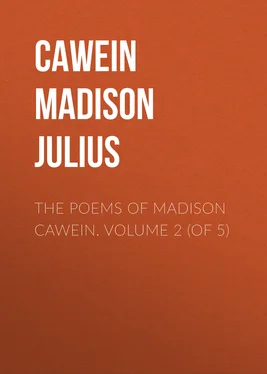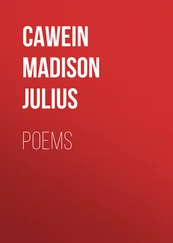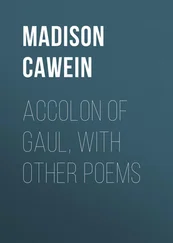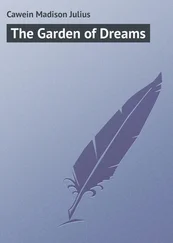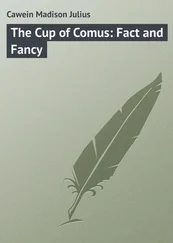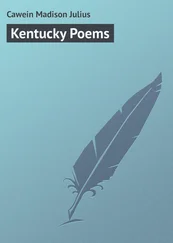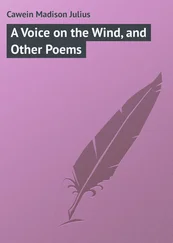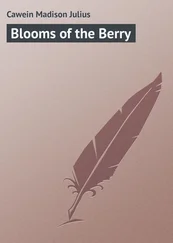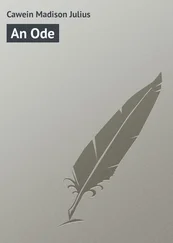Madison Cawein - The Poems of Madison Cawein. Volume 2 (of 5)
Здесь есть возможность читать онлайн «Madison Cawein - The Poems of Madison Cawein. Volume 2 (of 5)» — ознакомительный отрывок электронной книги совершенно бесплатно, а после прочтения отрывка купить полную версию. В некоторых случаях можно слушать аудио, скачать через торрент в формате fb2 и присутствует краткое содержание. Жанр: foreign_poetry, Поэзия, foreign_antique, foreign_prose, на английском языке. Описание произведения, (предисловие) а так же отзывы посетителей доступны на портале библиотеки ЛибКат.
- Название:The Poems of Madison Cawein. Volume 2 (of 5)
- Автор:
- Жанр:
- Год:неизвестен
- ISBN:нет данных
- Рейтинг книги:4 / 5. Голосов: 1
-
Избранное:Добавить в избранное
- Отзывы:
-
Ваша оценка:
- 80
- 1
- 2
- 3
- 4
- 5
The Poems of Madison Cawein. Volume 2 (of 5): краткое содержание, описание и аннотация
Предлагаем к чтению аннотацию, описание, краткое содержание или предисловие (зависит от того, что написал сам автор книги «The Poems of Madison Cawein. Volume 2 (of 5)»). Если вы не нашли необходимую информацию о книге — напишите в комментариях, мы постараемся отыскать её.
The Poems of Madison Cawein. Volume 2 (of 5) — читать онлайн ознакомительный отрывок
Ниже представлен текст книги, разбитый по страницам. Система сохранения места последней прочитанной страницы, позволяет с удобством читать онлайн бесплатно книгу «The Poems of Madison Cawein. Volume 2 (of 5)», без необходимости каждый раз заново искать на чём Вы остановились. Поставьте закладку, и сможете в любой момент перейти на страницу, на которой закончили чтение.
Интервал:
Закладка:
Nature grows liberal: from the beechen leaves
The beech-nuts’ burrs their little pockets thrust,
Bulged with the copper of the nuts that rust;
Above the grass the spendthrift spider weaves
A web of silver for which dawn designs
Thrice twenty rows of pearls: beneath the oak,
That rolls old roots in many gnarly lines,—
The polished acorns, from their saucers broke,
Strew oval agates.—On sonorous pines
The far wind organs; but the forest near
Is silent; and the blue-white smoke
Of burning brush, beyond that field of hay,
Hangs like a pillar in the atmosphere;
But now it shakes—it breaks and all the
vines And tree-tops tremble;—see! the wind is here!
Billowing and boisterous; and the smiling day
Rejoices in its clamor. Earth and sky
Resound with glory of its majesty,
Impetuous splendor of its rushing by.—
But on those heights the forest still is still,
Expectant of its coming.... Far away
Each anxious tree upon each waiting hill
Tingles anticipation, as in gray
Surmise of rapture. Now the first gusts play,
Like laughter low, about their rippling spines;
And now the wildwood, one exultant sway,
Shouts—and the light at each tumultuous pause,
The light that glooms and shines,
Seems hands in wild applause.
How glows that garden! though the white mists keep
The vagabonding flowers reminded of
Decay that comes to slay in open love,
When the full moon hangs cold and night is deep;
Unheeding still, their cardinal colors leap
And laugh encircled of the scythe of death,—
Like lovely children he prepares to reap,—
Staying his blade a breath
To mark their beauty ere, with one last sweep,
He lays them dead and turns away to weep.—
Let me admire,—
Before the sickle of the coming cold
Shall mow them down,—their beauties manifold:
How like to spurts of fire
That scarlet salvia lifts its blooms, which heap
Yon square of sunlight. And, as sparkles creep
Through charring parchment, up that window’s screen
The cypress dots with crimson all its green,
The haunt of many bees.
Cascading dark those porch-built lattices,
The nightshade bleeds with berries; drops of blood,
Hanging in clusters, ’mid the blue monk’s-hood.
There, in that garden old,
The bright-hued clumps of zinnias unfold
Their formal flowers; and the marigold
Lifts its pinched shred of orange sunset caught
And elfed in petals. The nasturtium,
All pungent leaved and acrid of perfume,
Hangs up its goblin bonnet, fairy-brought
From Gnomeland. There, predominant red,
And arrogant, the dahlia lifts its head,
Beside the balsam’s rose-stained horns of honey,
Deep in the murmuring, sunny,
Dry wildness of the weedy flower-bed;
Where crickets and the weed-bugs, noon and night,
Shrill dirges for the flowers that soon will die,
And flowers already dead.—
I seem to hear the passing Summer sigh:
A voice, that seems to weep,
“Too soon, too soon the Beautiful passes by!
And soon, amid her bowers,
Will dripping Autumn mourn with all her flowers.”—
If I, perchance, might peep
Beneath those leaves of podded hollyhocks,
That the bland wind with odorous whispers rocks,
I might behold her,—white
And weary,—Summer, ’mid her flowers asleep,
Her drowsy flowers asleep,
The withered poppies knotted in her locks.
II
The hips were reddening on this rose,
Those haws were hung with fire,
That day we went this way that goes
Up hills of bough and brier.
This hooked thorn caught her gown and seemed
Imploring her to linger;
Upon her hair a sun-ray streamed
Like some baptizing finger.
This false-foxglove, so golden now
With yellow blooms, like bangles,
Was bloomless then. But yonder bough,—
The sumac’s plume entangles,—
Was like an Indian’s painted face;
And, like a squaw, attended
That bush, in vague vermilion grace,
With beads of berries splendid.
And here we turned to mount that hill,
Down which the wild brook tumbles;
And, like to-day, that day was still,
And mild winds swayed the umbels
Of these wild-carrots, lawny gray:
And there, deep-dappled o’er us,
An orchard stretched; and in our way
Dropped ripened fruit before us.
With muffled thud the pippin fell,
And at our feet rolled dusty;
A hornet clinging to its bell,
The pear lay bruised and rusty:
The smell of pulpy peach and plum,
From which the juice oozed yellow,—
Around which bees made sleepy hum,—
Made warm the air and mellow.
And then we came where, many-hued,
The wet wild morning-glory
Hung its balloons in shadows dewed
For dawning’s offertory:
With bush and bramble, far away,
Beneath us stretched the valley,
Cleft of one creek, as clear as day,
That rippled musically.
The brown, the bronze, the green, the red
Of weed and brier ran riot
To walls of woods, whose pathways led
To nooks of whispering quiet:
Long waves of feathering goldenrod
Ran through the gray in patches,
As in a cloud the gold of God
Burns, that the sunset catches.
And there, above the blue hills rolled,
Like some far conflagration,
The sunset, flaming marigold,
We watched in exultation:
Then, turning homeward, she and I
Went in love’s sweet derangement—
How different now seem earth and sky,
Since this undreamed estrangement.
III
Here where the day is dimmest,
And silence company,
Some might find sympathy
For loss, or grief the grimmest,
In each great-hearted tree—
Here where the day is dimmest—
But, ah, there ’s none for me!
In leaves might find communion,
Returning sigh for sigh,
For love the heavens deny;
The love that yearns for union,
Yet parts and knows not why.—
In leaves might find communion—
But, ah, not I, not I!
My eyes with tears are aching.—
Why has she written me?
And will no longer see?—
My heart with grief is breaking,
With grief that this should be.—
My eyes with tears are aching—
Why has she written me?
IV
Better is death than sleep,
Better for tired eyes.—
Why do we weep and weep
When near us the solace lies?
There, in that stream, that, deep,—
Reflecting woods and skies,—
Could comfort all our sighs.
The mystery of things,
Of dreams, philosophies,
To which the mortal clings,
That can unriddle these.—
What is ’t the water sings?
What is ’t it promises?—
End to my miseries!
V
And here alone I sit and it is so!—
O vales and hills! O valley-lands and knobs!
What cure have you for woe?
What balm that robs
The brain of thought, the knowledge of its woe?
None! none! ah me! that my sick heart may know!—
The wearying sameness!—yet this thing is so!
This thing is so, and still the waters flow,
The leaves drop slowly down; the daylight throbs
With sun and wind, and yet this thing is so!
There is no sympathy in heaven or earth
For human sorrow! all we see is mirth,
Or madness; cruelty or lust;
Nature is heedless of her children’s grief;
Man is to her no more than is a leaf,
That buds and has its summer, that is brief,
Then falls, and mixes with the common dust.
Here, at this culvert’s mouth,
The shadowy water, flowing toward the south,
Seems deepest, stagnant-stayed.—
What is it yonder that makes me afraid?
Of my own self afraid?—I do not know!—
What power draws me to the striate stream?
What evil? or what dream?
Me! dropping pebbles in the quiet wave,
That echoes, strange as music in a cave,
Hollow and thin; vibrating in the shade,
As if ’t were tears that fell, and, falling, made
A crystal sound, a shadow wail of woe,
Wrung from the rocks and waters there below;
An ailing phantom that will not be laid;
Complaining ghosts of sobs that fill my breast,—
That will not forth,—and give my heart no rest.
Интервал:
Закладка:
Похожие книги на «The Poems of Madison Cawein. Volume 2 (of 5)»
Представляем Вашему вниманию похожие книги на «The Poems of Madison Cawein. Volume 2 (of 5)» списком для выбора. Мы отобрали схожую по названию и смыслу литературу в надежде предоставить читателям больше вариантов отыскать новые, интересные, ещё непрочитанные произведения.
Обсуждение, отзывы о книге «The Poems of Madison Cawein. Volume 2 (of 5)» и просто собственные мнения читателей. Оставьте ваши комментарии, напишите, что Вы думаете о произведении, его смысле или главных героях. Укажите что конкретно понравилось, а что нет, и почему Вы так считаете.
